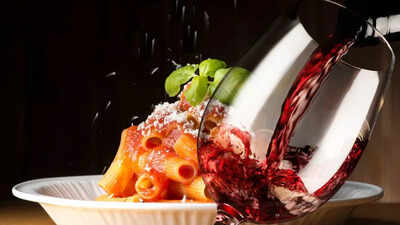ARTICLE AD BOX

We all love a good drink with our meals, but sometimes that seemingly perfect pairing can backfire big time. Imagine biting into a chocolate dessert while sipping red wine, only to end up with bloating, indigestion, or worse.According to a study published in the Journal of Public Health, consuming food with alcohol can significantly affect short-term health outcomes. Experts highlight that pairing alcohol with foods like beans, bread, or caffeinated drinks may slow digestion, interfere with nutrient absorption, and even lead to uncomfortable bloating or gas.The science is clear; it's not just about taste; your body responds differently to some combinations, and ignoring this can leave your stomach and mood in turmoil.
In this article, we're breaking down five alcohol and food pairings that are better left apart. Think of it as a guide to eating and drinking smarter so you can enjoy your favorite flavors without the unwanted aftermath. Cheers to tasty choices that actually agree with your body.
Alcohol and food pairings that are bad for your health
Bread and beer: A gut-challenging duo

Beer and bread both contain yeast, which can cause bloating and gas when consumed together. Eating them at the same time may overwhelm your digestive system, making you feel uncomfortable.
To enjoy beer without upsetting your stomach, try pairing it with lighter foods such as grilled vegetables, salads, or lean proteins. This allows you to savor the drink while keeping your digestion on track.
Chocolate and alcohol: A sweet combination that can upset your stomach

Chocolate, especially dark chocolate, is high in caffeine and other compounds that may irritate the digestive tract. Pairing it with alcohol can make bloating, gas, or acid reflux worse. If you want to enjoy chocolate and alcohol, try consuming them at separate times or in small portions.
This way, you can indulge your sweet tooth without the digestive aftermath.
Beans or lentils with alcohol: Hard to digest together

Beans and lentils are packed with nutrients but can be difficult to digest due to their fiber and complex carbohydrates. Drinking alcohol with a legume-heavy meal can slow digestion and increase gas, bloating, and discomfort. To prevent digestive distress, consume alcohol before or after a bean-rich meal rather than during it. This helps your body process both food and drink more comfortably.
Caffeinated drinks and alcohol: A risky mix

Mixing alcohol with caffeinated beverages, such as energy drinks or coffee-based cocktails, can make you feel more alert than you really are. This can lead to drinking more alcohol than intended and increase the likelihood of overconsumption. To enjoy alcohol safely, avoid caffeinated mixers and consume alcohol at times separate from caffeinated drinks.
Salty foods with alcohol: Dehydration and overconsumption

Salty snacks like fries, chips, or salted nuts can increase thirst, prompting you to drink more alcohol than you need.
High salt intake can dehydrate your body and worsen hangovers, making it harder to enjoy your night responsibly. If you want to snack while drinking, choose lower-sodium options and stay hydrated to prevent overconsumption.Being mindful of how you combine alcohol and food can make a significant difference in digestion, hydration, and overall comfort. Avoiding pairings like bread with beer, chocolate with alcohol, beans with alcohol, caffeinated drinks, and salty foods can reduce bloating, discomfort, and overconsumption. Making smarter choices allows you to enjoy both your meals and drinks responsibly, leaving you feeling satisfied rather than uncomfortable. With these tips in mind, you can savor your favorite flavors without the digestive and health consequences.Disclaimer: This article is for general informational purposes only and is not a substitute for professional medical advice, diagnosis, or treatment. Always seek the guidance of a qualified healthcare provider regarding any medical condition or lifestyle change.Also read| Best cooking oil for Indian kitchens: Olive, sunflower, mustard, coconut oil or ghee



.png)
.png)
.png)
















 1 day ago
5
1 day ago
5








 English (US) ·
English (US) ·